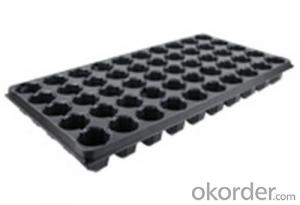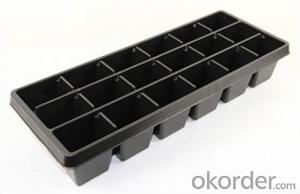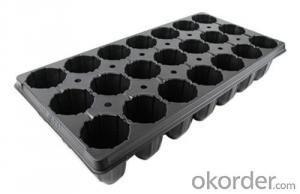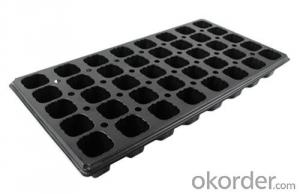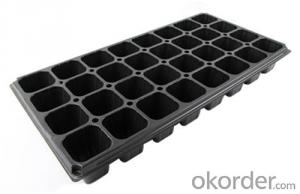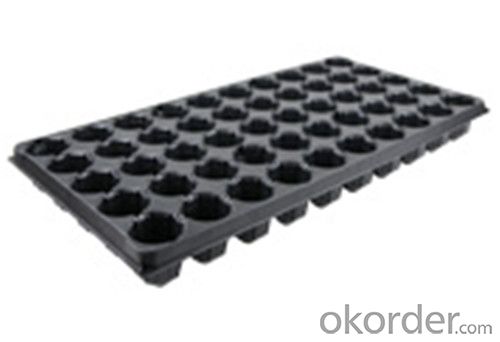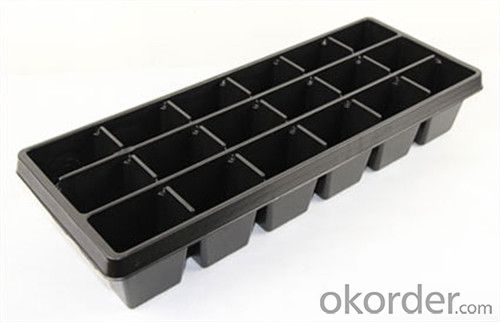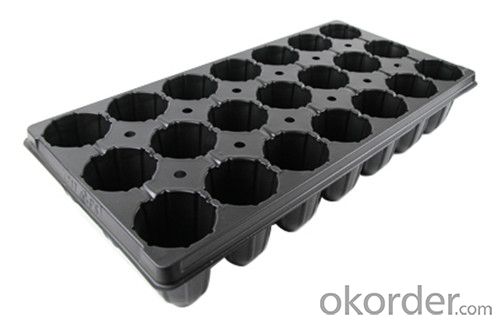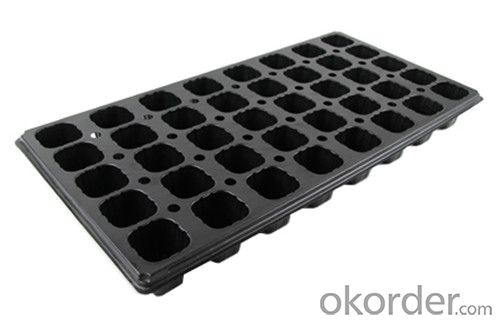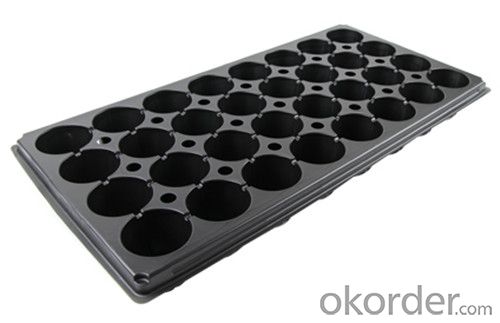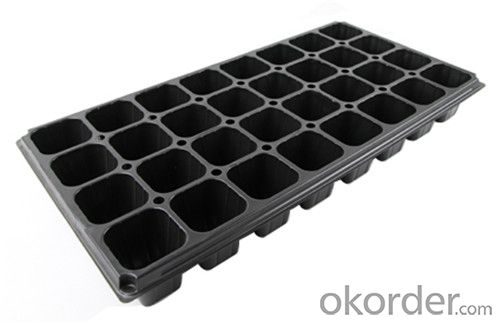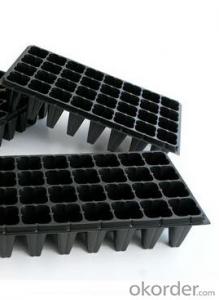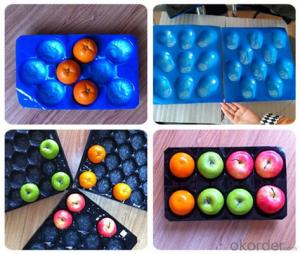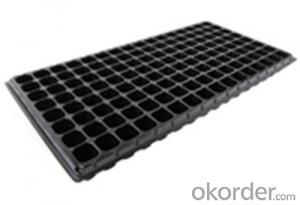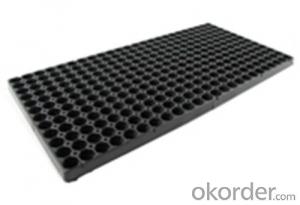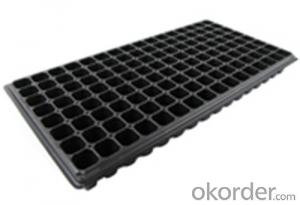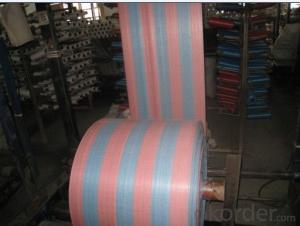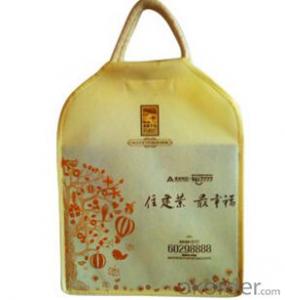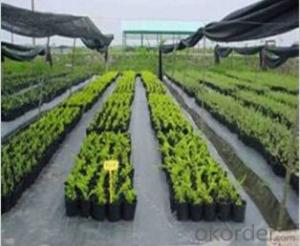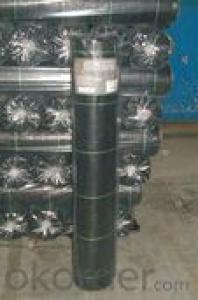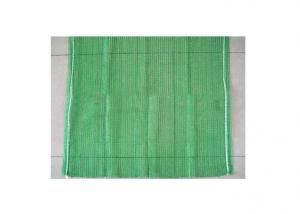Plastic Seed Tray Plug Tray for Green House
- Loading Port:
- China main port
- Payment Terms:
- TT OR LC
- Min Order Qty:
- 1000 pc
- Supply Capability:
- 10000 pc/month
OKorder Service Pledge
OKorder Financial Service
You Might Also Like
Structure of the seed tray:
Top quality and competitive price.
Variety design and good appearance.
Easy to use, and remove.
Durable and reusable.
Eco-Friendly.
Description Main Features of the seed tray:
Ideal for Starting seeds and Transplanting Seedling.
Suitable for both manual and automatic planting.
Suitable for Propagating Vegetables, Flowers and other plant from seed in green-house or indoors.
Seed Tray Images:
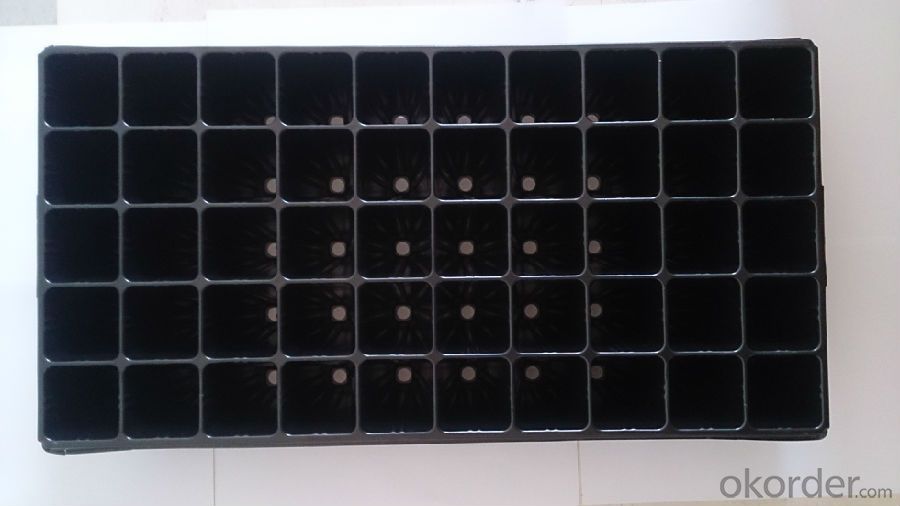
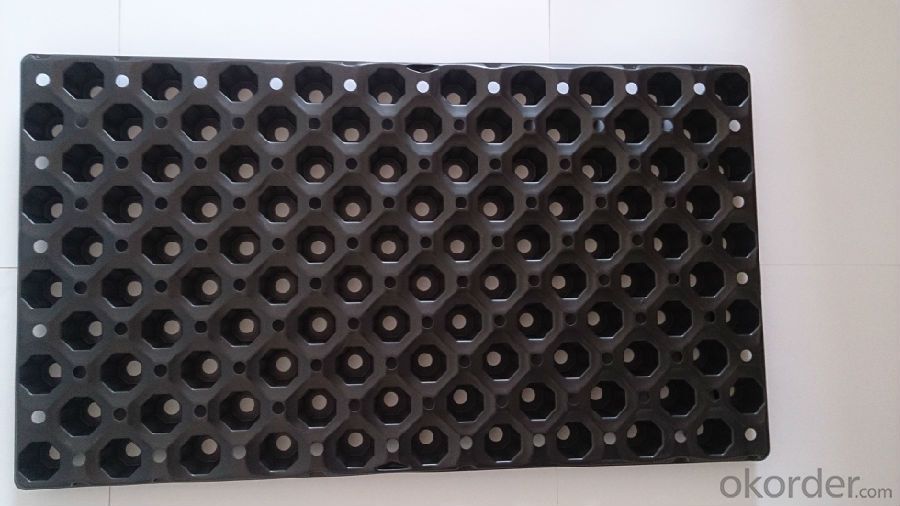
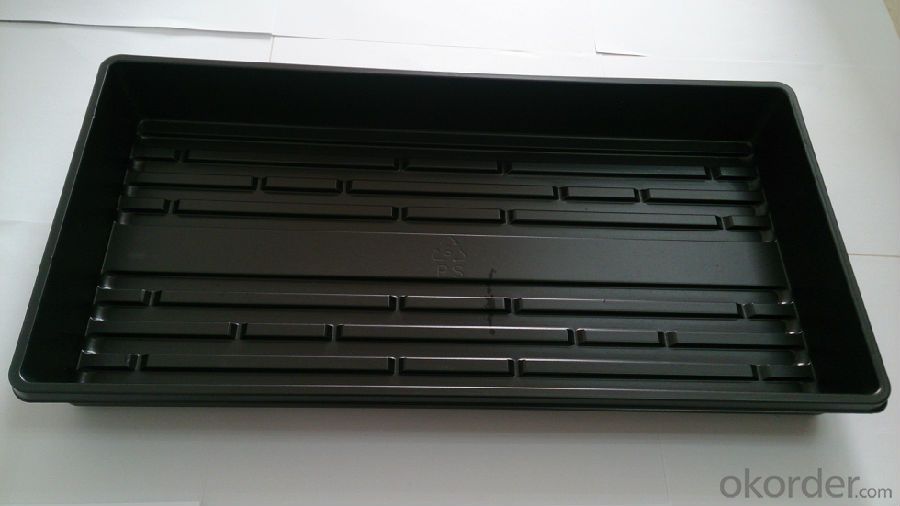
Seed Tray Specification:
Material: HIPS/PVC
Thickness: 0.5mm-1.5mm, Standard:1mm
Weight: 80g(±5)g-230g(±5)g, Standard weight:155g(±5)g
Size: length:490mm-540mm, width:190mm-345mm,depth:25mm-150mm
Standard:54mmX28mm
Cell count: 18-512
Package: carton
Using time: 8-10 times
FAQ:
Q:How Can I Get A Sample?
A:You can get samples by communicate with our export sales.
Q:How Long Is Delivery?
A:Delivery time will be 7-25 days according to order quantity.
Q:What Is The MOQ?
A:Our MOQ is 1*20FT container quantity, allow to mix several items.
Q:What Is Our Normal Payments Terms?
A:Our normal payment terms now is T/T, L/C or Western Union,Papal.
Q:How Do I Order Your Products?
A:You can check our website for any items you interest and you can also get communication with our export sales and order for it accordingly.
Q:What Kinds Of Material We Use In Our Product?
A:Our plastic flower pots use material such as PP polymer or PE polymer.
Thickness vs. Weight
Thickness of trays are from 0.5mm to 1.0mm.
1.0mm: 155g±5g; 100pcs/ctn.
0.9mm: 140g±5g; 120pcs/ctn.
0.7mm: 110g±5g; 150pcs/ctn.
0.6mm: 95g±5g; 180pcs/ctn.
0.5mm: 80g±5g; 200pcs/ctn.
Using time:
thickness of 0.5mm can be used 1 to 2 times.
thickness of 0.6mm can be used 3 to 4 times.
thickness of 0.7mm can be used 5 to 6 times.
thickness of 0.8mm can be used 7 to 8 times.
thickness of 0.9mm can be used 8 to 9 times.
thickness of 1.0mm can be used 8 to 10 times.
- Q: Can the application of biodegradable waterproofing materials by farmers help in lessening environmental pollution?
- <p>Yes, farmers can use biodegradable waterproofing materials to reduce environmental pollution. These materials are designed to break down naturally over time, reducing the accumulation of non-biodegradable waste in landfills and the environment. They can be particularly useful in agriculture for protecting crops from water damage and maintaining soil moisture without leaving behind harmful residues. By choosing eco-friendly options, farmers contribute to sustainable farming practices and help protect ecosystems from pollution caused by synthetic materials.</p>
- Q: What are some ground cover options for regions with heavy shade?
- Some ground cover options for regions with heavy shade include ferns, mosses, hostas, vinca minor, and creeping myrtle.
- Q: What are the different types of plastic clips used in horticulture?
- There are several types of plastic clips commonly used in horticulture, including plant clips, tomato clips, vine clips, and grafting clips. These clips are designed to secure plants to support structures, provide support for growing vines, and aid in grafting procedures. Each type of clip serves a specific purpose and is chosen based on the needs of the plants and the desired outcome in horticultural practices.
- Q: How are plastic pallets used in agriculture?
- Plastic pallets are widely used in agriculture for various purposes such as storing, transporting, and handling agricultural products. They provide a hygienic and durable solution for moving produce, crops, and other agricultural materials. Plastic pallets are resistant to moisture, pests, and chemicals, ensuring the integrity and quality of the goods being transported. Additionally, they are lightweight, stackable, and easy to clean, making them highly convenient and efficient in agricultural operations.
- Q: I have a plastic cage right now for my hamster (syrian hamster if it makes a diff) but im thinking of getting a wire cagewhich is better in your opinion?and dont just say its up to me
- In my experience, a wire cage is good. It gives them something to climb, and it's better for ventilation. Also if you can get a larger (2/3 floors) wire cage that's even better! Syrian hamsters can get quite big, and it's good to give them as much space as possible. Also a Syrian could get stuck in anything with tubes or plastic sections.
- Q: What are the rules or laws governing the use of plastic products in agriculture?
- <p>Yes, there are regulations on the use of agricultural plastic products. These regulations vary by country but generally aim to reduce environmental impact, promote recycling, and ensure safety. For instance, the European Union has implemented regulations like the Single-Use Plastics Directive, which targets the reduction of plastic waste in agriculture. In the United States, the Food and Drug Administration (FDA) oversees the safety of plastic materials that come into contact with food. Additionally, many regions have specific guidelines for the disposal and recycling of agricultural plastics to minimize pollution. Compliance with these regulations is crucial for agricultural businesses to operate legally and sustainably.</p>
- Q: How do you control ground cover from invading flower beds?
- One effective way to control ground cover from invading flower beds is to create a physical barrier. This can be done by installing edging or borders around the flower beds to create a clear separation between the ground cover and the flowers. Additionally, regular maintenance such as pulling out any ground cover that starts encroaching on the flower beds can help keep them in check.
- Q: What are some ground cover options for dry soil?
- Some ground cover options for dry soil include creeping thyme, sedum, lavender, yarrow, and ornamental grasses such as blue fescue or feather reed grass.
- Q: (I have my tongue piercing for a little over 3 weeks now.)Ok, so I just had my tongue ring changed two days ago to a ring that has a shorter bar, but bigger metal balls. Unfortunately, since the switch I cracked/chipped my tooth (from biting down on one of the metal balls.....yeah, that sucked!) Now I am terrified of the metal balls. I heard that plastic balls are better and won't crack your teeth, so I went out and bought some. When I was switching to the plastic balls, I noticed that the plastic balls that I bought were much bigger than metal ones that I already have.My questions are:Should I stick with the plastic ones or should I stick with the smaller metal ones??? Would the really small metal balls crack my teeth too???Thank you in advance for your answers! Serious answers only.....
- Plastic Tongue Bars
- Q: A plastic ship? You will need to remove the palastic liner.This sentence was on my English text.
- It is a liner for something, a waste bin for example, that is made of plastic.
Send your message to us
Plastic Seed Tray Plug Tray for Green House
- Loading Port:
- China main port
- Payment Terms:
- TT OR LC
- Min Order Qty:
- 1000 pc
- Supply Capability:
- 10000 pc/month
OKorder Service Pledge
OKorder Financial Service
Similar products
Hot products
Hot Searches
Related keywords
